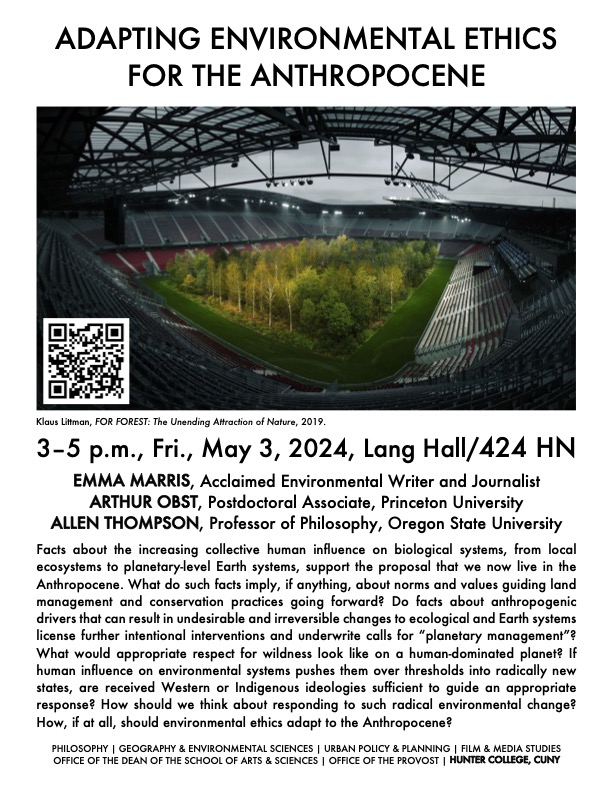Social Metaphysics Workshop – location tbd
ALL TALKS AVAILABLE ON ZOOM
SOME ALSO IN PERSON (Graduate Center room 7102)
Talks organized and hosted by Ryan McElhaney
To get Zoom links: Email davidrosenthal1@gmail.com
2/2: Edward Elliott
Philosophy, University of Leeds; soon to be at Notre Dame
*** HYBRID: Graduate Center Room 7102 ***
2/9: Sami R. Yousif
Psychology, University of Pennsylvania
*** HYBRID: Graduate Center Room 7102 ***
2/16: Susan E. Carey
Psychology, Harvard University
*** HYBRID: Graduate Center Room 7102 ***
2/23: Amy Kind
Philosophy, Claremont McKenna College
3/1: Johannes Fahrenfort
Neuroscience, Conscious Brain Lab, Vrije Universiteit Amsterdam
and Universiteit van Amsterdam
3/8: Sam Coleman
Philosophy, University of Hertfordshire
3/15: Christopher Hill
Philosophy, Brown University
3/22: Nicholas Humphrey
Neuropsychology, London School of Economics and Darwin College Cambridge
3/29: No talk—Easter weekend
4/5: James R. O’Shea
Philosophy, University College Dublin
4/12: Daniel Stoljar
Philosophy, Australian National University
4/19 and 4/26: No talks—CUNY spring break
5/3: Willem A. deVries
Philosophy, University of New Hampshire
*** HYBRID: Graduate Center Room 7102 ***
5/10: Kathleen Akins and Martin Hahn
Philosophy, Simon Fraser University
*** HYBRID: Graduate Center Room 7102 ***
Facts about the increasing collective human influence on biological systems, from local ecosystems to planetary-level Earth systems, support the proposal that we now live in the Anthropocene. What do such facts imply, if anything, about norms and values guiding land management and conservation practices going forward? Do facts about anthropogenic drivers that can result in undesirable and irreversible changes to ecological and Earth systems license further intentional interventions and underwrite calls for “planetary management”? What would appropriate respect for wildness look like on a human-dominated planet? If human influence on environmental systems pushes them over thresholds into radically new states, are received Western or Indigenous ideologies sufficient to guide an appropriate response? How should we think about responding to such radical environmental change? How, if at all, should environmental ethics adapt to the Anthropocene?

ABSTRACT: Spurred partly by recent attempts to ethically assess various negative effects of the attention economy, philosophers have begun to pay more attention to the role that attention plays in our ethical lives. This has included some more general discussion of the ethics of attention. In this talk, I add to this recent discussion by outlining a proposal for a comprehensive ethics of attention. On my proposal, an ethics of attention includes norms that stem from the role that attention plays in the formation of our character, in constituting our relationships and social roles, and in our other ethical decision making and behavior. Because of attention’s nature as a finite resource, and because our various roles and relationships involve interpersonal expectations for how others allocate their attention, an ethics of attention should provide norms that govern how we collectively allocate our attention among these morally important purposes. Because these morally important purposes are all competing for our attention, one goal of an ethics of attention should be to find practices that help to synergize how people meet these demands. I call such a set of practices a “social-attentional scheme”, and propose that the ultimate goal of an ethics of attention is to find an optimal social-attentional scheme. I conclude by discussing the various ways in which we can understand early Confucian ethics as providing us with one such social-attentional scheme, and propose some lessons we can take from this Confucian example as we try to continue developing a contemporary ethics of attention.
With responses from Elizabeth Edenberg (CUNY Baruch)
Presented by THE COLUMBIA SOCIETY FOR COMPARATIVE PHILOSOPHY
NOTE ON ENTRY FOR NON-COLUMBIA GUESTS: The door to Philosophy Hall will only open with a Columbia University ID card. If you do not have this card please arrive early where someone will be standing outside until the meeting begins. If you arrive late, you can ask someone walking nearby to let you in or contact Cole at cf2798@columbia.edu. Please only contact Cole as a final resource so as not to interrupt the talk.
RSVP IS REQUIRED FOR DINNER:. Dinner will take place at a nearby restaurant. Please contact Cole at cf2798@columbia.edu for further information. RSVPs are limited.
ALL TALKS AVAILABLE ON ZOOM
SOME ALSO IN PERSON (Graduate Center room 7102)
Talks organized and hosted by Ryan McElhaney
To get Zoom links: Email davidrosenthal1@gmail.com
2/2: Edward Elliott
Philosophy, University of Leeds; soon to be at Notre Dame
*** HYBRID: Graduate Center Room 7102 ***
2/9: Sami R. Yousif
Psychology, University of Pennsylvania
*** HYBRID: Graduate Center Room 7102 ***
2/16: Susan E. Carey
Psychology, Harvard University
*** HYBRID: Graduate Center Room 7102 ***
2/23: Amy Kind
Philosophy, Claremont McKenna College
3/1: Johannes Fahrenfort
Neuroscience, Conscious Brain Lab, Vrije Universiteit Amsterdam
and Universiteit van Amsterdam
3/8: Sam Coleman
Philosophy, University of Hertfordshire
3/15: Christopher Hill
Philosophy, Brown University
3/22: Nicholas Humphrey
Neuropsychology, London School of Economics and Darwin College Cambridge
3/29: No talk—Easter weekend
4/5: James R. O’Shea
Philosophy, University College Dublin
4/12: Daniel Stoljar
Philosophy, Australian National University
4/19 and 4/26: No talks—CUNY spring break
5/3: Willem A. deVries
Philosophy, University of New Hampshire
*** HYBRID: Graduate Center Room 7102 ***
5/10: Kathleen Akins and Martin Hahn
Philosophy, Simon Fraser University
*** HYBRID: Graduate Center Room 7102 ***